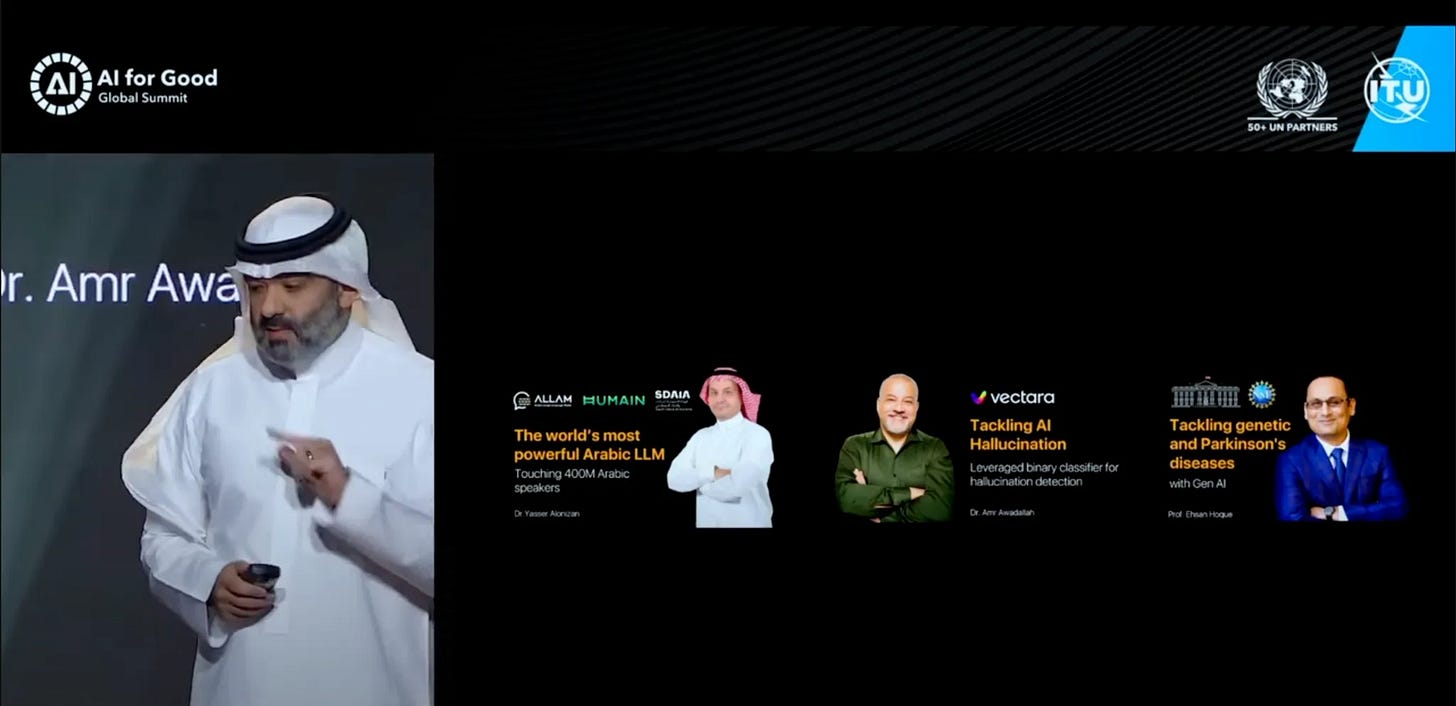🪐 “The Next Divide Is Existential”: Why Abdullah Alswaha’s AI Speech Should Be a Global Wake-Up Call
Saudi Arabia isn’t just connecting the unconnected — it’s redefining who gets to build the future of intelligence.
🎧 Listen to this Article
🛰️ INTRODUCTION: A Speech the World Wasn’t Ready For
While most of the world’s AI headlines are consumed by GPUs, benchmark leaderboards, and startup valuations, something far more structural — and far more consequential — just happened at the ITU AI for Good summit.
Saudi Arabia’s Minister of Communications and Information Technology, Abdullah Alswaha, stood on stage and issued what might be the most important AI policy speech of 2025 — a direct, data-backed warning about an emerging AI divide that could eclipse every digital gap we’ve closed over the last 50 years.
If HUMAIN was Saudi’s technical masterstroke, this speech is its moral manifesto.
📜From Analog to AI — The Hidden Cost of Connection
Alswaha begins with history. The analog era took 112 years to connect 800 million people. The digital age did better — 5.5 billion connected in 50 years.
But behind the numbers, a pattern emerged: every wave of progress introduced new divides.
In the analog era, the Global North earned 16x more than the South.
In the digital era, we’re still leaving 2.6 billion people behind.
Even now, we’re facing a gender gap that will take a century to close.
Progress didn’t close gaps. It reshaped them.
⚠️ The Intelligent Age Is Here — And It’s Not Fair
We’re now entering what Alswaha calls the “Intelligent Age.” And the stakes are existential.
It took 50 years to create $16T in digital value.
We’ll do it again in 5 years — but only for those who are included.
Three new divides now threaten to define the AI age:
Compute Divide — a few nations hoarding the hardware.
Data Divide — 90% of training data is in English, ignoring most of the planet.
Algorithmic Divide — a handful of actors deciding what’s “bias,” what’s “truth.”
The most chilling stat? 80% of AI capacity is controlled by just two countries.
This isn’t digital inequality. It’s intelligence inequality.
🇸🇦 How Saudi Arabia Plans to Flip the Table
This isn’t a warning without action. Under Crown Prince Mohammed bin Salman, Saudi Arabia is responding not with rhetoric, but with infrastructure.
KAUST is now top 10 globally in computer science.
36% of Saudi tech talent is female — higher than Silicon Valley.
Saudi hosts 70% of inference capacity across Asia, Africa, and Europe — at $0.11/token.
The Arabic LLM push is real — with a focus on de-biasing and hallucination control.
The Kingdom launched the Global AI Hub Law, a public consultation to create a safe harbor for innovators worldwide.
This isn’t about “catching up.” It’s about building the rails for a multipolar AI world.
🏥 Why AI Must Be Grounded in Real Impact
Alswaha doesn’t stop at infrastructure. He roots the AI agenda in human outcomes.
First full robotic heart transplant? Done.
AI in diabetes and genetic disease management? Live.
Carbon intensity of AI compute? Among the world’s lowest.
This is not AI for vanity metrics. It’s AI for livelihoods, longevity, and legitimacy.
🌐 The Multistakeholder Future vs. the 2-Nation Trap
Alswaha’s real argument? We cannot let two countries control the fate of intelligence.
Only 32 countries have AI zones.
80% of global AI power resides in just two.
If this trend holds, the next trillion-dollar decisions will not be made globally — they’ll be made by default.
Saudi Arabia’s pitch is simple: regain control of compute, data, and algorithms — together.
🔚 FINAL THOUGHT: Why This Speech Is Bigger Than Saudi
What Alswaha said wasn’t just about the Kingdom. It was a blueprint for AI justice in a world rapidly consolidating intelligence into the hands of the few.
From Riyadh to Geneva, this speech signals a shift.
Not just in infrastructure.
Not just in ambition.
But in who gets to shape the values of the next machine age.
As the world debates alignment, Alswaha is asking a deeper question:
“What if intelligence itself is misaligned — not with ethics, but with access?”
The answer isn’t just political. It’s infrastructural. And the time to act is now.
📬 More from Kaya Dispatch
→ 🇸🇦🤖 HUMAIN and the Saudi AI Supercycle: A deep dive into the Kingdom’s sovereign AI stack.
→ Listen to the 🇸🇦 Saudi Pulse Podcast: Real-world AI powering compliance, credit, and regulated markets in Saudi — decoded for operators.
👋 DM always open. Writing from Riyadh.



